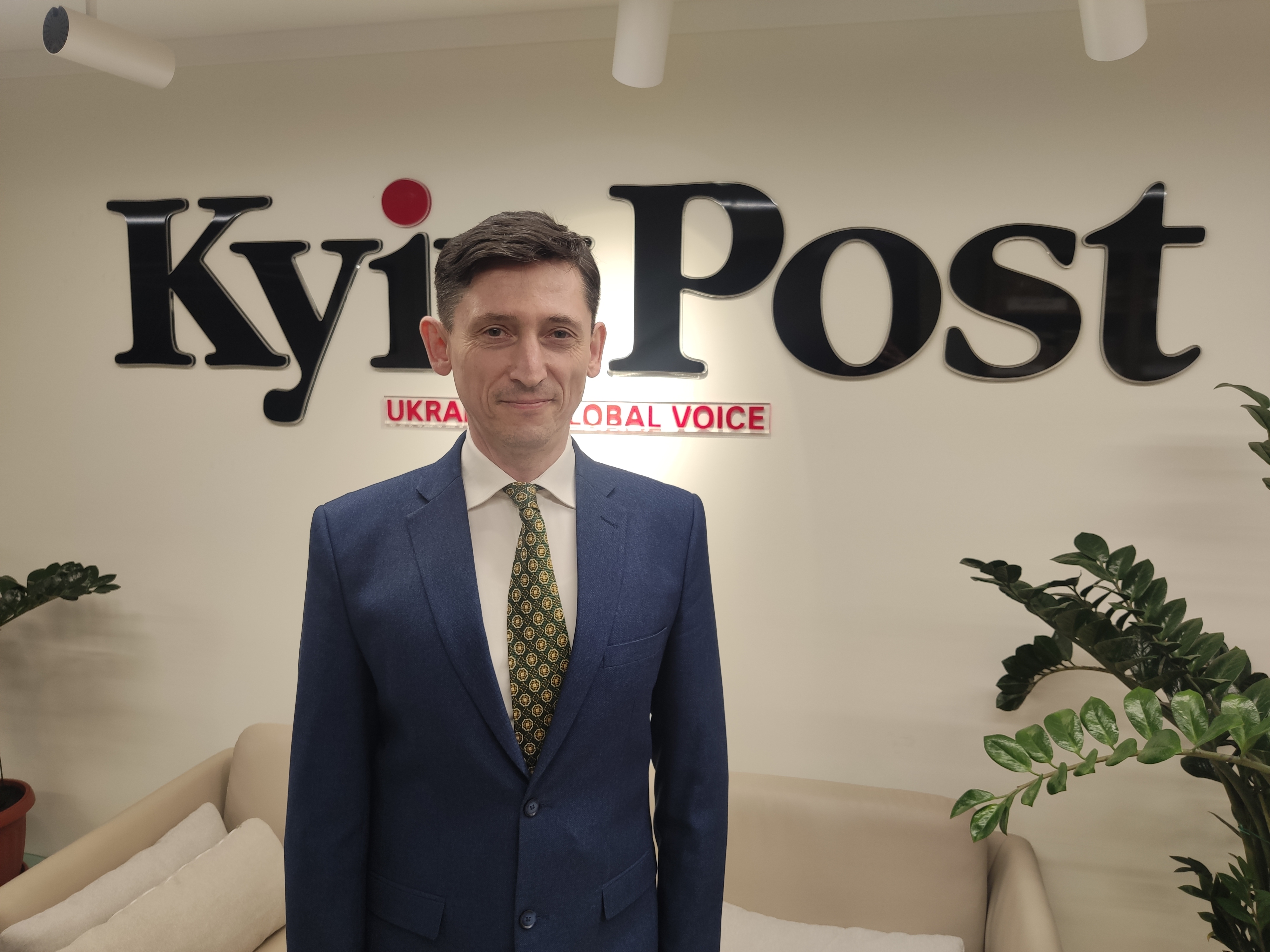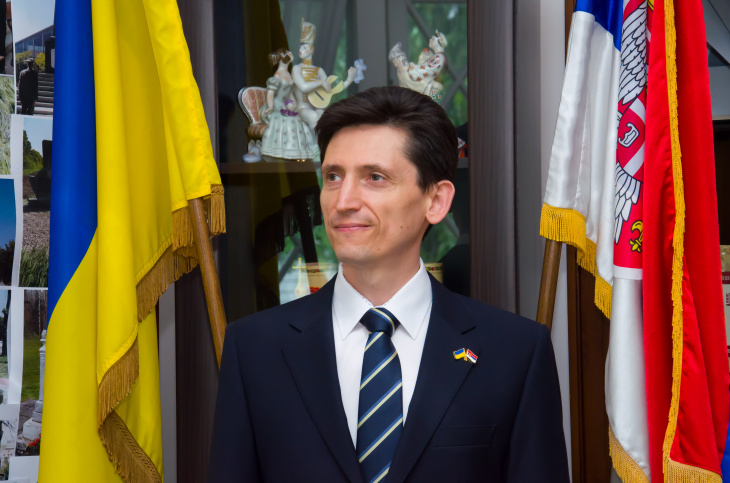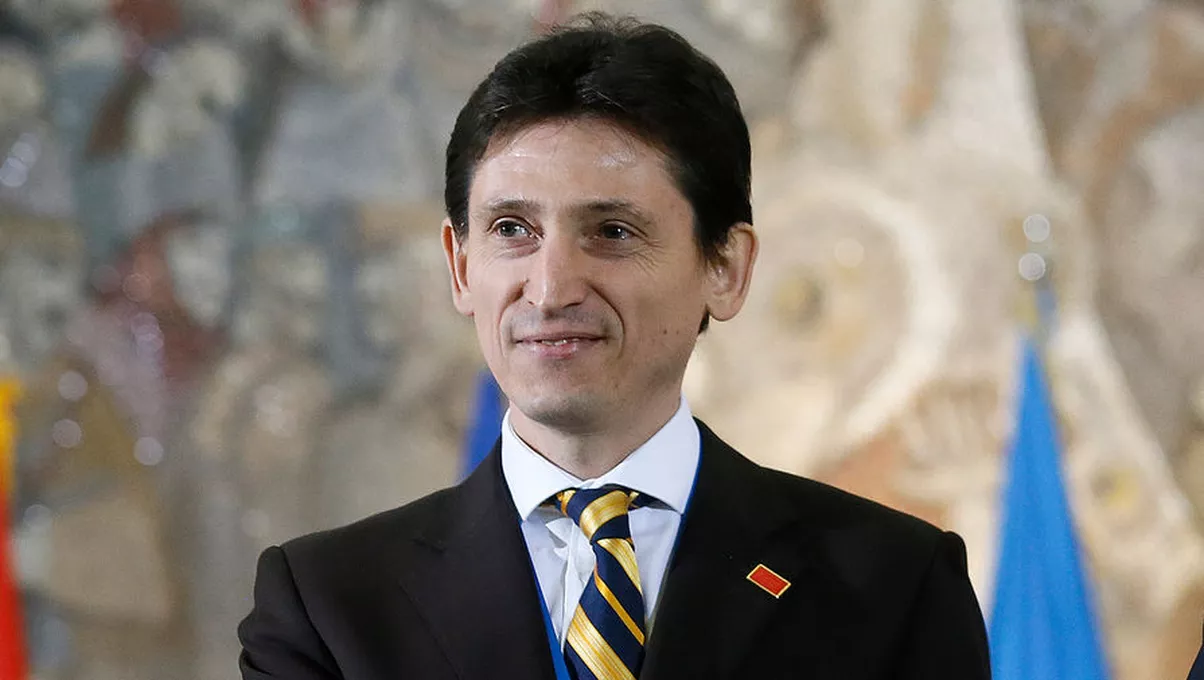Oleksandr Aleksandrovych, the former ambassador of Ukraine to Serbia (June 2015-April 2022), now the incumbent Ambassador-at-Large of the Foreign Ministry for the Study of International Experience in Economic Transformation, told Kyiv Post about the prospects for Ukrainian-Serbian relations, the steadfast support on the part of Europe and the United States, regardless of future elections and his vision of the future of our country in a hundred years.
JOIN US ON TELEGRAM
Follow our coverage of the war on the @Kyivpost_official.
Serbian people have sympathy for the Ukrainian people.
Since the full-scale Russian invasion of Ukraine, Serbia has become the only EU candidate country that refused to impose sanctions against Russia. At the same time, in the UN General Assembly, it officially condemned aggression against Ukraine. How can you explain this dichotomy?
After the start of the full-scale invasion, Serbia supported us in the UN General Assembly and condemned Russian aggression for the first time. Its position at that moment changed for the better. Why is Serbia supposedly so pro-Russian? I would name at least four reasons. The first one is that Belgrade considers itself the rightful successor of former Yugoslavia, while the political elite of Serbia speak highly of the times of socialist Yugoslavia under the leadership of Tito [editor's note: Josip Broz Tito - the leader of Yugoslavia from 1945 until his death in 1980], who managed to balance between the West and the Soviet Union. Now the situation is radically different - after the beginning of Russian aggression against Ukraine, as early as 2014, it became clear that it would not be possible to sit on two chairs at the same time.

America the Horrible
The second reason for this conditionally pro-Russian position of Serbia is that the country was 100% dependent on the supply of Russian energy resources. If we talk about petroleum products, the controlling stake in the largest Serbian oil company is held by Gazpromneft, that is, in fact, by Russia. Therefore, Serbia could not immediately make drastic moves because it could end up without gas, oil, and petroleum products.
The third reason is that for a long time Serbian politicians were impressed by Russian President Putin's leadership style – the so-called guided democracy. The fourth reason – in my opinion, the weakest - is the historical traditional ties between the two fraternal Slavic peoples – Russian and Serbian, as well as ties between the Orthodox churches of both countries.
It is clear as for the authorities. Whom do Serbian people support?
Serbia has never been against Ukraine, and Serbian people have sympathy for the Ukrainian people. After the full-scale Russian invasion, the Serbian authorities could not ignore the opinion of their own people. Anti-Western, anti-NATO sentiments relating to the bombing of Belgrade and the territory of Serbia in 1999 are still alive in Serbia. When Russia started bombing Ukraine in February 2022, the Serbs told me, "We understand you very well, it should not be this way." When it brought truly terrible destruction, when it became clear that Russia was targeting not only military facilities but also civilian infrastructure, the Serbs began to tell me, "No, you know, you have it much, much worse."
Various pro-Russian rallies did take place on the territory of Serbia. Until 2014, the Serbs said that they loved both Russians and Ukrainians. The element of Slavic culture and Orthodoxy is very important for them. In no way can it be said that they were somehow anti-Ukrainian. When the full-scale war began, the majority of Serbs said that they were very afraid and regretful, and it was painful to watch what was happening, "We really want you – the Ukrainians – and the Russians to reconcile as soon as possible, because it is very difficult for us to choose between you." However, I want to emphasize that after the atrocities in Bucha, Mariupol, the south of Ukraine, after the bombings more and more Serbs are now on the side of Ukraine.

Oleksandr Aleksandrovych, the former ambassador of Ukraine to Serbia/Photo by Julia Struck
The country has not joined sanctions against Russia since 2014. Can the situation change? Are there any signals?
I can predict that Serbia will impose sanctions. The issue of sanctions is primarily economic. I mentioned their total dependence on Russian energy resources, which is now gradually weakening. In addition, when Milosevic in the early 1990s unleashed a war in the Balkans, sanctions were imposed against Belgrade. Although I constantly reminded the Serbs that it Russia, as a member of the UN Security Council, had not vetoed the decision to impose sanctions.
Indeed, since 2014, Serbia has been trying to avoid imposing sanctions against Russia. However, I noticed that their Minister of Economy suddenly - and this was voiced for the first time - announced that the country was suffering a lot because it did not impose sanctions. They said that Serbia was under strong pressure from both Brussels and Washington. Therefore, their Minister of Economy did not rule out that Serbia would join the sanctions. I understand very well that such statements are not made just like that - such a statement had to have been authorized by top management.
Serbia is moving towards Ukraine rather than Russia. Everyone wants to join the winner.
How can the Ukrainian authorities influence Serbia to impose anti-Russian sanctions sooner?
We have been conducting this dialogue with the Serbs for a very long time. From 2014 to 2023, little by little, Serbia is moving towards Ukraine rather than Russia. Of course, this is also related to the course of events on the battlefield - everyone wants to join the winner. After it became clear that Kyiv was not captured in three days and Ukraine will stand, the policy of many countries, including Serbia, changed accordingly.
Can the European Union somehow influence them?
Undoubtedly, the EU has very serious levers of influence on Serbia because the lion's share of all trade, investments, financial and humanitarian aid falls precisely on the member states of the European Union. I am convinced that the EU is constantly in dialogue with Serbia on this matter. Apparently, it has found additional arguments, perhaps financial or political, which will increasingly incline the Serbs towards Ukraine.
Looking back, what miscalculations do you see as an ambassador? Would you like to change something?
All these years I worked actively enough to make Ukraine sound, in particular, in the Serbian information space. As for miscalculations, to be honest, I could not do otherwise to change this situation more dramatically in favor of Ukraine. It was necessary for this situation to mature, in its own time. I do not think that anyone in my place could speed up this process. After the start of the full-scale invasion, it was no longer possible to turn a blind eye to everything that was happening in Ukraine.
Poland is currently Ukraine's ally and its main advocate in the EU. Parliamentary elections will be held there in autumn. Can their support for Ukraine weaken if Poland focuses on domestic political processes?
I do not think that the support for Ukraine from our sincere friend, Poland, will weaken. It is one of those countries that give us most support, both politically and militarily; it has sheltered millions of our refugees. Poland realizes the threat not only for Ukraine but also for the whole of Europe – if Ukraine loses, then Poland, the Baltic States and, possibly, Moldova would be next. Therefore, Poland has its own interest. I do not believe that there will be any radical changes regarding the aid provided to Ukraine.
I am convinced of the unchanging support on the part of the EU, whatever the elections and wherever they take place.
These are not the only elections in the EU scheduled for this year. Should we be concerned about the consequences in any particular state?
Since 2014, there have been so many fears that, say, the right wing came to power in Italy, there is one pro-Russian party in Austria, and the pro-Russian party won more votes in Germany. No matter which country you take, there were fears that tomorrow everything would collapse, sanctions would end, etc. However, there have been several packages of sanctions. As the people say, "the EU is slow to saddle up but rides fast."
In my opinion, when the full-scale invasion started only the United States believed in us. Europe was ready to surrender us to the Russians. I say this frankly. There were cases when certain ministers and vice prime ministers said, "In three days everything will be over and you – the Ukrainians - will have to accept the new reality." This did not happen. In the period from mid-March to early April, when we began to liberate the northern territories, the situation changed dramatically. Obviously, the European Union has achieved consensus so that support for Ukraine will remain stable, unchanged and will be strengthened.

Oleksandr Aleksandrovych, the former ambassador of Ukraine to Serbia/Photo: serbia.mfa.gov.ua
What are the reasons for such drastic changes?
There are many reasons. First, there was understanding that other countries could follow Ukraine. This is obvious because the logic of Putin's actions is that if you are weak, if you try to make compromises, he will go as far as he is allowed. Therefore, after Kyiv both Warsaw and Berlin could fall, the Russians could reach Lisbon. Secondly, Europeans and their leaders realized that Ukraine defends common European values that had been neglected in many EU countries. This gives Europe a chance to revive them and show that these are not empty words.
So, are you now sure of unwavering support from the European Union?
During these eight years and especially during the last, Europe and the United States have invested a lot of money in our country. This includes at least $5 billion a month to maintain our balance of payments so that there is no large budget deficit. Not to mention military, energy, and humanitarian aid. If I am not mistaken, about $60 billion was spent last year. Speaking pragmatically, they will have to return these funds. No one invests so much money to say then, "That's it, and we no longer support Ukraine." That is why I am convinced of the unchanging support on the part of the EU, whatever the elections and wherever they take place.
What about Hungary's position? Many Ukrainians have the impression that it is putting a spoke in Ukraine's wheel, playing along with Russia. How can Brussels influence the situation?
It has influence on the country, witness that Hungary did not refuse those sanctions that had already been imposed. It should be mentioned that not everything is so smooth in the relations between Budapest and Brussels. The European Commission suspended the payment of the next financial tranche to Hungary owing to issues with democracy in the country, with the independence of the judiciary and mass media. There are levers of influence. When it comes to financial leverage, it is very effective indeed.
As for politics in Hungary, it is not about some boundless and sincere love between the Hungarians and the Russians – it could be a situational marriage. Historically, Hungary lost a large part of its territories after the First World War. Now it has certain phantom pains, which it still transfers to not only Ukraine but also other neighbors, on whose territory Hungarian minorities live. However, dialogue with Hungary should continue. We should remember that they are actively providing us with humanitarian aid. Sociological studies show that more than 50% of Hungarians sincerely sympathize with Ukrainians. Therefore, we need to calmly go through it, wait it out and definitely continue dialogue with them.
Ukraine will be one of the most powerful European countries. We will have a very strong army.
Could European support increase significantly in the near future?
If we talk about financial support – non-returnable grants or loans at a zero or very low interest rate – what is given now is enough for our primary needs. I think it will not decrease in the future, however I do not know whether it will increase. Now it looks optimal. What we need most now are, of course, weapons. It seems to me that Europe and the West have realized that the sooner Ukraine wins on the battlefield, the less Western citizens will have to spend on our recovery. Therefore, no one will want it to turn into a frozen conflict or drag it out for many years. This is economically self-destructive for Ukraine, for Europe, and for the United States. I am not a military expert but, in my opinion, given geopolitical, economic and financial realities, this war will not last for long. I hope that by the end of this year the situation will develop in our favor.

Oleksandr Aleksandrovych, the former ambassador of Ukraine to Serbia/Photo: my.ua
You had been working at the Embassy of Ukraine in the USA for four years. Do you think that the results of the 2024 presidential elections could adversely affect US aid for Ukraine?
When Donald Trump became president, at first it seemed that this assistance would completely stop. However, the strength of real democracy means that the main authority there is not only and not so much the president or prime minister but institutions. The very strong institutional basis of the United States - the so-called system of checks and balances - did not allow a 180-degree change in their support policy. Over the past 32 years of our independence, the United States had stable bipartisan support for Ukraine. Can the Republicans win? Yes, they can. However, the Democrats can also win. I am convinced that no matter who becomes the next US president, their support for Ukraine will not weaken.
In your book "Ukraine in the Next 100 Years", you made quite far-sighted forecasts. In short, how do you see our state a century from now? Will Russia exist in its current form at that time?
Europe will survive. We will remain part of Europe, and Ukraine will be one of the most powerful European countries. We will have a very strong army. It is already very strong. In a hundred years, Ukrainians will have clean air, clean drinking water, healthy organic food, as well as a very strong high-tech army that will protect all this and all of us from enemies and climate migrants.
As for Russia, I predict that it will be denuclearized by 2030. Russia will exist for a while. Now many people say that Russia must collapse, and then all our troubles will end. I share this opinion. First, they must be deprived of weapons of mass destruction - nuclear, chemical, and biological. Only then can we be sure that it will not attack us. How to achieve this? The only way is total isolation. If we deprive the so-called Russian elite access to Western accounts and capital, prohibit them from travelling and confiscate property abroad, it will turn into a jar of spiders. They won't be able to stand it. In 7-8 years of total isolation, they will crawl on their knees and ask, "Give us the opportunity to go to the Riviera, return our yachts, foreign accounts, and we will give you all our nuclear weapons for nothing." So it will be sometime in 2030. The Russian Federation will start to disintegrate 10-15 years after that.
You can also highlight the text and press Ctrl + Enter














